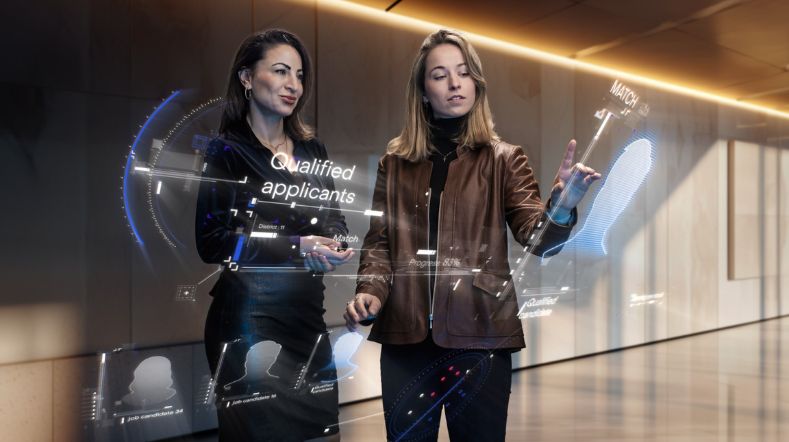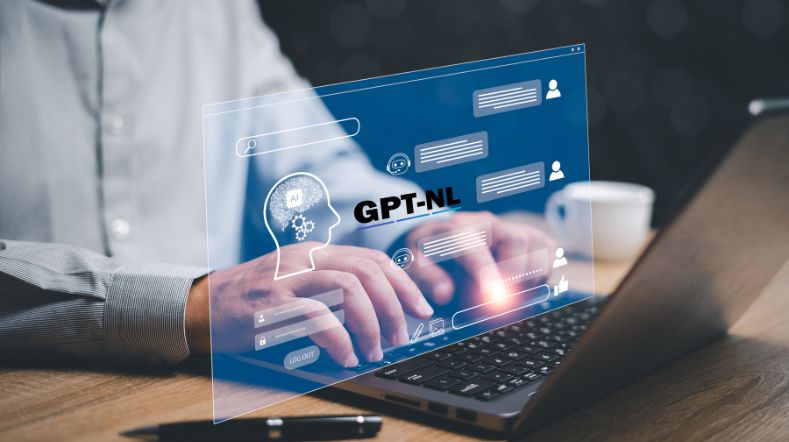Georgette Fijneman on the promise of AI for health insurers
Hanneke Molema, senior consultant healthy living at TNO, interviews Georgette Fijneman, CEO of health insurer Zilveren Kruis since 2017. What is the promise of AI for one of the Netherlands’ largest health insurers?
A conversation with Georgette Fijneman
Do you think AI has brought prosperity and do you consider AI a partner in everyday life?
Before we discuss the role technology can play in healthcare challenges, I’d like to know your personal thoughts on AI. Do you think AI has brought prosperity and do you consider AI a partner in everyday life?
‘That’s quite a difficult question because, as human beings, we often don’t realise all the things AI is used for. We may understand this professionally, but as people, citizens, or consumers, we’re often unaware of how particular information has been arrived at or how it has been brought to us.
People sometimes worry about what happens with their data. Are they in reliable hands? This is, of course, a highly significant question. But the positive side is that AI gives us a lot. Consider the convenience aspect, for example, like Netflix knowing our taste in films. Or a watch that tells us whether we’re moving or sleeping enough.’
Do you think mistrust in AI in healthcare limits the development of AI?
We know that there is quite some mistrust towards AI in healthcare. This attitude may limit the possibilities of developing AI. Is this something you recognise?
‘Absolutely. There are several aspects at play here. It’s partly based on mistrust. What exactly is it used for? Looking at how IT has been set up in healthcare, there are also technical impossibilities. The applications are fantastic, however. A modern-day operating theatre, for example, is a sight to behold! Surgeons spend more time looking at a screen than at their patients. But when it comes to data (in other words, connecting the exchange of information between hospitals, GPs, district nurses, and patients), there’s still a lot to be done. We simply haven’t worked this area out yet. Privacy plays an important role in this, meaning we can’t always use data the way we’d like to. At the same time, it’s good that these restrictions, which prevent us from accessing data we don’t need, exist. As Zilveren Kruis, we process 350 million claims per year, but we don’t link them to clinical pictures. Which is a good thing, because that’s not our concern.’
‘We want the patient to receive the best possible treatment, and not for technology to get in the way of that.’
Are you developing technology that will help share data securely?
‘The protected status of data in the Netherlands means we have very few opportunities to use them on an aggregated basis. At times, that’s a tremendous shame. To give a highly practical example, children under the age of eighteen can visit the dentist for free. But we see that a lot of people with children don’t submit claims for dentist visits. Chances are these people simply don’t know that their children are eligible for free dental care. We’d love to be able to send them a letter. But we’re not allowed to.
That applies to us as an insurer, but we’d like to see more options in healthcare in a broader sense. This would allow hospitals, for example, to coordinate with each other on the locations of complex treatments and their aftercare. In this way, technology can truly help us evolve. In such instances, the data help us as insurers to provide better services and improve the organisation of our processes. After all, we want the patient to receive the best possible treatment, and not for technology to get in the way of that. That’s why we have projects with TNO that deal with the innovative issue of secure data sharing.'
‘We now have in-house digital experts and analysts in all parts of our company. Innovation runs through the whole organisation. And we’re far from finished.’
How do your employees feel about the use of data?
How do you see this in your own organisation? Both Zilveren Kruis and Achmea are increasingly using data. How do your employees feel about that? And how do you guide them in this?
‘On the one hand, digitising human jobs is, of course, threatening. But on the other hand, it’s also amazingly cool. Five years ago, we didn’t have an innovation department. We do now. We now have in-house digital experts and analysts in all parts of our company. Innovation runs through the whole organisation. And we’re far from finished.’
How do you arrive at the right algorithms?
Do you also have ethical discussions? You use algorithms. How do you arrive at the right algorithms? And how do you check whether what you do is in line with those data? Do you discuss this a lot?
‘Yes, of course, on two levels. For example, we now have a robot that we use to answer customer questions. But we first had this robot tag along with colleagues working in our call centre. At a certain point, we felt confident the robot was giving the right answers. Only then did we allow it to start conversing with our customers. As an added benefit, our employees really enjoy working with the robot. It also helps them to find the information they need more quickly. There are also ethical issues to discuss. Is what we’re doing best for the patient? It may be efficient, but are we meeting our customers’ expectations? These are matters we need to keep a close eye on.’
‘Technology should never set the standard for us.’
What role and what potential do you see for AI? And what do you expect from TNO in the coming years?
‘I think there’s a lot of potential in AI, but we also have to be careful not to go overboard. You can already see this in, for example, prevention discussions. What are we still allowed to eat? What are we no longer allowed to eat? Are we exercising enough? And what is the right kind of exercise? We don’t want to regulate all this. And we’re realising that we should never arrive at a situation where there is only one standard. There will always be personal variations. And there should always be the individual willingness to use them. Such factors are extremely important. And I believe parties like TNO have an important role to play in this. What I’ve always liked about TNO is that all that knowledge exists in-house. TNO is also looking into the ethical aspect. What does it mean for healthcare? How does it affect the people who have to use it? And I believe it’s incredibly important for there to continue to be a partnership between the digital and the human. We’re really going to have to do it together. Technology should never set the standard for us.’
Download vision paper
Download vision paper ‘Towards Digital Life: A vision of AI in 2032’
More about 'Towards Digital Life: A vision of AI in 2032'
Get inspired
From reactive to proactive: How organisations gain control over GenAI governance


How TNO is leading the drive towards sovereign, responsible Dutch AI


TNO’s Vision for Responsible AI That Works


ObjectivEye: AI-assisted human recruitment


Large dataset news organizations for Dutch AI language model GPT-NL

